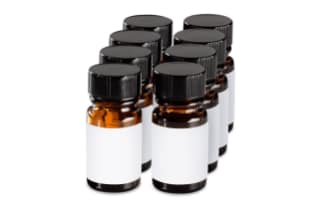
The GlycoWorks SPE Reagents contains the crucial reagents such as the elution buffer and sample diluent needed for running the SPE sample cleanup portion of the GlycoWorks RapiFluor-MS N-Glycan Kit. This could also be used with the GlycoWorks reductive amination protocol for optimized elution of up to tetrasialyated glycans. The GlycoWorks SPE Reagents contains:
(4) 5 ml/vial Elution Buffer (200mM Ammonium Acetate 95/5 Water/ACN pH 7)
(4) 8 ml/vial Sample Diluent (DMF/ACN Mixture)
|
Number of Analysis |
96 |
|
Type |
Sample Preparation Workflow |
|
Separation Mode |
HILIC |
|
Detection Method |
HRMS, MS, MS/MS, UV |
|
Storage Condition |
Refer to the storage recommendations of each sub-package |
|
System Type |
LC-MS |
|
Shelf Life |
Refer to the storage recommendations of each sub-package |
|
UNSPSC |
41116104 |
|
Application |
Glycan |
|
Brand |
GlycoWorks |
|
Product Type |
Application Kits |
|
Units per Package |
1 pk |

GlycoWorks SPE Reagents
The GlycoWorks RapiFluor-MS N-Glycan Kit's SPE sample cleanup requires the use of specific reagents, such as the sample diluent and elution buffer, both of which are included in the GlycoWorks SPE Reagents. The GlycoWorks reductive amination approach might also be employed in conjunction with this for improved elution of up to tetrasialyated glycans. Four 8 ml/vial Sample Diluents (DMF/ACN Mixture) and four 5 ml/vial Elution Buffers (200 mM Ammonium Acetate 95/5 Water/ACN pH 7) are included in the GlycoWorks SPE Reagents.
The special qualities and chemical make-up of the Rapi-Fluor MS provide a great detailed analysis of unidentified peaks in your sample using fluorescence and improved mass spectral response. The GlycoWorks SPE Reagents can be used for dextran calibration ladders and glycan performance test standards benchmarking, method development, and troubleshooting. The RapiFluor-MS has made it possible to characterize N-glycans with more assurance and accuracy. Due to its compatibility with MS technology, it has also made it possible to identify and modify previously unidentified glycan structures. For sample preparation for glycan analysis, Waters GlycoWorks consumables provide a more practical, comprehensive, and efficient solution.
The GlycoWorks SPE Reagents aid in the quick and simple synthesis of released, tagged N-glycan samples, the streamlining of methods to reduce mistakes and sample losses, and the much-enhanced FLR and MS signal for the speedy identification of low-abundance N-linked glycans. The GlycoWorks SPE Reagents can help with quick analyst training and method dissemination within an enterprise.
On our online shop for lab equipment, you can find out more about the GlycoWorks SPE Reagents and related products. You can also browse our website to read reviews and get references for further items in our catalog.
You might also be interested in the GlycoWorks RapiFluor-MS N-Glycan Refill Kit-24 sample, which comes with the GlycoWorks Deglycosylation Module (186008841) and the GlycoWorks Labeling Module (186008091). These two modules are shipped together so they can be used to supplement the 176003712 or 176003713 kits or as additional reagents for the 96 sample kits. The GlycoWorks RapiFluor-MS N-Glycan Refill Kit includes supplies to process 24 samples in a 3x8 size, which is a crucial point to make.
Why Might A Gradient System Be Required?
In chromatography, gradient systems offer flexibility in adjusting the flow rate and modifying solvent/buffer conditions to enhance separations. These systems not only expedite the separation process but also facilitate faster column re-equilibration. A four-solvent gradient system comprising methanol, acetonitrile, ammonium acetate buffer, and formic acid solution is particularly beneficial for technique development. On the other hand, isocratic systems, commonly utilized in quality control laboratories, maintain a constant composition of the mobile phase, enabling rapid separations.